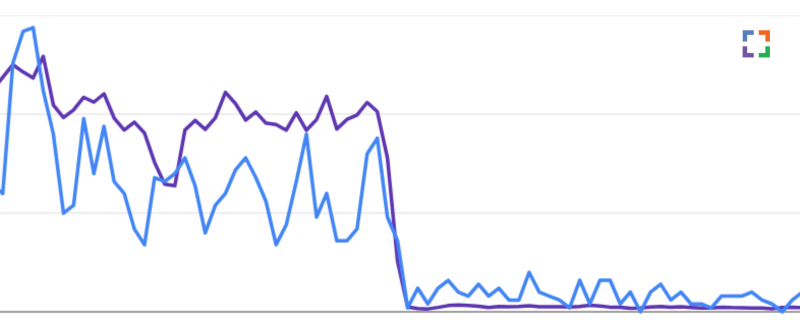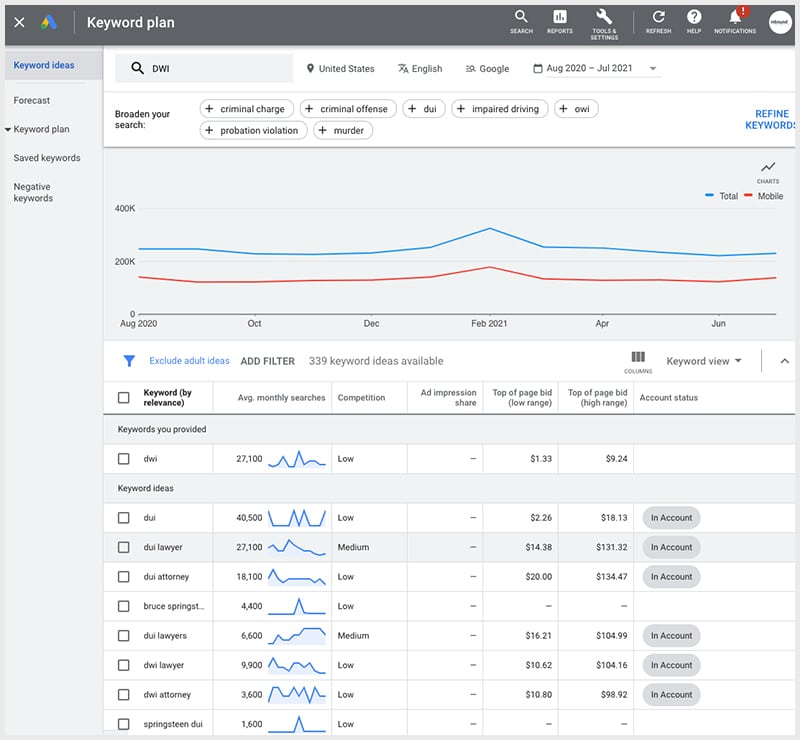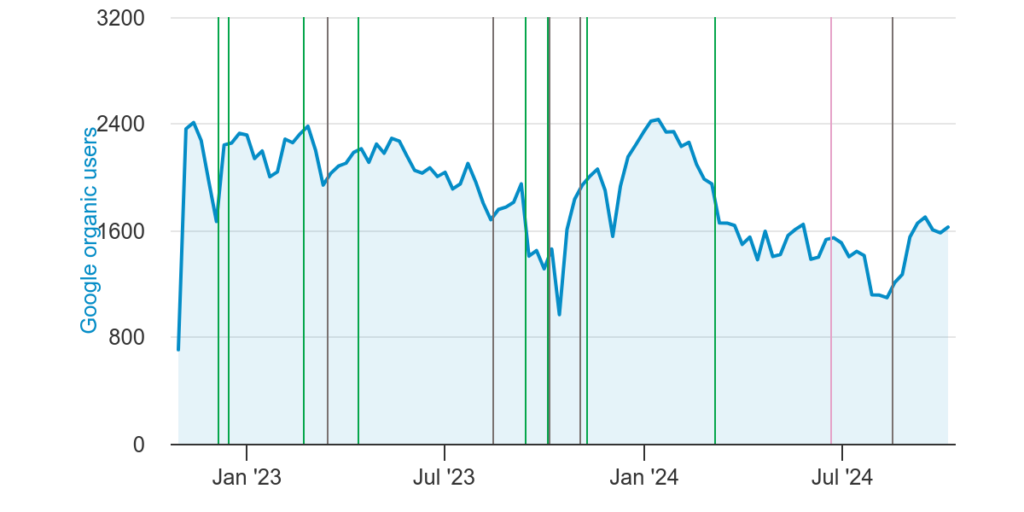
Google’s search algorithm wields significant influence over online visibility, especially for law firms that rely on search engine optimization (SEO) to attract new clients.
As Google continues to refine its algorithm, law firms must stay attuned to these updates to ensure their websites remain competitive and visible to potential clients. Every algorithm update introduces shifts in how content is ranked, impacting the strategies law firms use to maintain their online presence and generate leads.
For law firms, content quality, relevance, and authority are crucial elements that determine how well they rank in search results. Since Google’s algorithm is continuously evolving, it’s not enough to set and forget an SEO strategy.
Instead, an adaptable approach is necessary—one that responds to Google’s frequent updates and anticipates changes in how content is assessed and valued.
This article is designed to serve as a dynamic guide for law firms. By covering recent major algorithm updates and providing insights on how to align your SEO practices with Google’s latest standards, this resource will help your firm stay competitive.
Updated regularly, this article will offer timely recommendations for law firms to adjust their strategies and keep their websites optimized for search.
Google’s algorithm updates are designed to improve the quality of search results, ensuring that users find content that is helpful, relevant, and trustworthy. For law firms, these updates can have a profound impact on visibility, as they directly influence which pages appear in search results and how prominently they’re ranked. Understanding the purpose behind these updates—and how they affect SEO—is key to maintaining a strong online presence.
Each update serves a unique purpose. Some are broad core updates that overhaul Google’s ranking priorities, while others are more specific, targeting issues like spammy content, low-quality sites, or ensuring the promotion of original, helpful content. Although each update might seem different, Google’s overall goal remains the same: to connect users with high-quality content that meets their search intent.
For law firms, it’s essential to focus on three primary factors that Google values in search rankings: content quality, relevance, and authority.
Google assesses content based on its usefulness and accuracy, its relevance to what users are searching for, and the authority of the source. Law firm websites can optimize for these factors by creating well-researched, original content that addresses client questions and demonstrates the firm’s expertise in specific practice areas.
Keeping pace with Google’s algorithm updates requires a proactive approach. Law firms need to monitor Google’s updates and be ready to adjust their SEO strategies accordingly. By understanding the core intent of each update, firms can prioritize SEO tactics that align with Google’s evolving standards and ensure their content remains competitive.
The next section covers recent updates in detail, providing guidance on how to adapt to each one and maintain optimal rankings.
Google has released several significant algorithm updates, each with unique implications for SEO and content strategies. These updates focus on promoting high-quality, relevant, and original content while demoting content that doesn’t meet Google’s standards.
Here’s a breakdown of the most impactful updates and how they affect law firm websites.
The March 2023 Core Update focused on enhancing Google’s ability to assess content usefulness.
It aimed to boost content that effectively serves user needs and demote content that is less helpful.
The August 2023 Core Update continued Google’s focus on rewarding high-quality content while penalizing low-value SEO tactics.
It reinforced Google’s goal of delivering valuable, user-centric information.
The September 2023 update focused on promoting content that truly helps users.
This update aimed to reduce the visibility of content created solely for SEO purposes without providing real user value.
The November 2023 Core Update put a stronger emphasis on authority and trustworthiness.
Google aimed to boost rankings for authoritative sites, particularly those demonstrating expertise within their fields.
The March 2024 Core Update targeted spammy practices and low-quality content.
It emphasized content authenticity and introduced new spam policies to address issues like expired domain abuse and content scaling abuse.
The August 2024 Core Update reinforced Google’s commitment to originality and quality in content.
This update aimed to prioritize sites with unique, well-crafted content, providing a boost to those offering fresh perspectives and insights.
Google’s algorithm updates are continuous, with core and targeted updates rolling out several times a year.
Keeping up with these changes can seem overwhelming, but with the right tools and practices, law firms can stay ahead and proactively adjust their SEO strategy.
One of the most effective ways to monitor the impact of Google’s algorithm updates is through analytics tools like Google Analytics and Google Search Console. These platforms allow you to track key performance metrics such as traffic, bounce rates, and keyword rankings. With each new algorithm update, monitor these metrics closely to see if there are significant fluctuations that might indicate an impact on your rankings.

Google often announces major algorithm updates on its official channels, including the Google Search Central Blog and Twitter. Staying informed about these announcements can help you anticipate changes and proactively adjust your content strategy.
Some SEO news websites, like Search Engine Journal and Moz Blog, also provide in-depth analyses and guidance on each update, offering helpful insights into what law firms should focus on.
When Google releases a new update, the initial reaction might be to wait and see how it impacts your site. However, proactively adjusting your SEO strategy can give you an advantage and help you minimize any potential drop in rankings. Here are some proactive steps law firms can take:
A resilient SEO strategy is one that can weather changes in Google’s algorithm without significant disruption. By building a foundation based on best practices—such as creating original content, using clear SEO-friendly structures, and avoiding manipulative tactics—your law firm can maintain its rankings even as Google’s standards evolve.
Staying proactive, vigilant, and committed to quality will help ensure your website’s long-term success in search rankings.
With these tools and strategies, your law firm can effectively monitor Google’s updates and adjust as needed to maintain and improve your search visibility.
In the next section, we’ll dive into practical tips specifically for law firms, covering how to adapt content and SEO practices to align with Google’s latest requirements.

Navigating Google’s algorithm updates can be challenging, but a few key strategies can help law firms stay aligned with search best practices.
These tips focus on creating high-quality, user-centric content that meets Google’s evolving standards and, ultimately, serves potential clients effectively.
Every update from Google emphasizes the importance of understanding and meeting user intent. For law firms, this means producing content that directly addresses the questions and needs of prospective clients.
Rather than simply aiming to rank for popular keywords, structure your content to provide value and clarity to users searching for legal information.
With Google’s emphasis on content quality, law firms should prioritize well-crafted content over producing a high volume of articles. Aim to cover each topic thoroughly and make sure each piece is unique, insightful, and professionally written.
Google favors content that demonstrates authority, trustworthiness, and expertise. For law firms, this means not only sharing knowledge but also showcasing your firm’s unique expertise in specific practice areas. Establish your firm as an authoritative source by creating detailed, accurate, and valuable resources.
Google’s algorithm penalizes content that tries to game the system with excessive keyword usage, manipulative linking practices, or other “black-hat” SEO tactics. Instead, focus on SEO practices that prioritize user experience and relevancy.
Staying up-to-date with your site’s SEO performance is essential. Use analytics to track how each page is performing in search, especially after a Google update, and identify any changes that may be needed to align with Google’s standards.
A robust SEO strategy focuses on long-term quality rather than reacting to each algorithm change. By prioritizing content that aligns with Google’s principles of quality, relevance, and user focus, you can build a foundation that will support your firm’s online visibility through future updates.
With these practical tips, law firms can keep their SEO efforts aligned with Google’s standards and ensure their websites remain valuable resources for prospective clients. The next section will address frequently asked questions, providing additional clarity on the impact of Google’s updates and how law firms can maintain top rankings.

“My website continues to dominate all the top website searches in my industry and my business has grown 10-fold as a result.”
Oykhman Criminal Defence
Google rolls out thousands of small updates each year, but major updates typically occur a few times annually. Law firms can keep track by following Google’s official announcements on the Google Search Central Blog and monitoring SEO news sources like Search Engine Journal. Regularly checking Google Analytics and Search Console for performance changes can also provide insights into the impact of updates.
The key is to focus on high-quality, user-centric content rather than trying to manipulate rankings through aggressive SEO tactics. Avoid keyword stuffing, low-quality link-building schemes, and other black-hat SEO techniques. Instead, ensure content is original, relevant, and useful to your audience.
Law firms can align with user intent by addressing specific client questions and providing clear, direct answers. Consider the types of legal issues prospective clients are likely searching for, and structure content to be accessible and informative. Using clear headings, bullet points, and plain language also improves readability and aligns with user expectations.
Google values content that is well-researched, original, and valuable to users. For law firms, this means creating resources that not only rank well but also position the firm as an authoritative source. High-quality content demonstrates expertise and builds trust with potential clients, both of which are key for long-term SEO success.
To measure the impact, law firms should look for sudden changes in traffic, keyword rankings, and page performance using Google Analytics and Google Search Console. A notable decline in traffic following an update may indicate that adjustments are needed in content strategy, while positive changes suggest alignment with the update’s criteria.
When updating old content, focus on improving clarity, relevance, and depth. Ensure the information is accurate and up-to-date, add any new legal developments, and incorporate natural keyword variations. Removing outdated information and enhancing the readability of your content can also improve its performance post-update.
Smaller firms can compete by focusing on niche areas and creating in-depth, specific content that larger firms might overlook. By establishing authority in a specialized area, smaller firms can attract highly targeted traffic. Focusing on local SEO, such as optimizing for specific cities or regions, is also beneficial.
While AI-generated content can help streamline content creation, it’s important to ensure it meets quality and originality standards. Google favors human-centric, high-quality content, so any AI-generated material should be carefully reviewed, edited, and customized to reflect the firm’s expertise and perspective.
Google assesses authority based on factors like backlinks from reputable sites, quality of content, and user engagement metrics. Law firms can build authority by publishing comprehensive, accurate information, obtaining backlinks from trusted legal and local sources, and actively engaging with their audience through helpful, informative content.
To avoid ranking drops, law firms should steer clear of outdated SEO practices like keyword stuffing, irrelevant backlinks, and thin content. Avoid over-optimization and focus on creating high-quality, helpful content. Consistently adhering to Google’s standards of quality and relevance helps to protect rankings through future updates.
Ready to maximize your marketing budget? Fill out the contact form or call us today for a complimentary consultation. We will listen to your story, work to define your business objectives, and recommend an approach to deliver maximum ROI for your firm.
By using this website, you consent to our use of cookies in accordance with our Cookie Policy. Cookies help us enhance your browsing experience and provide personalized content. If you do not agree to our use of cookies, please adjust your browser settings accordingly.